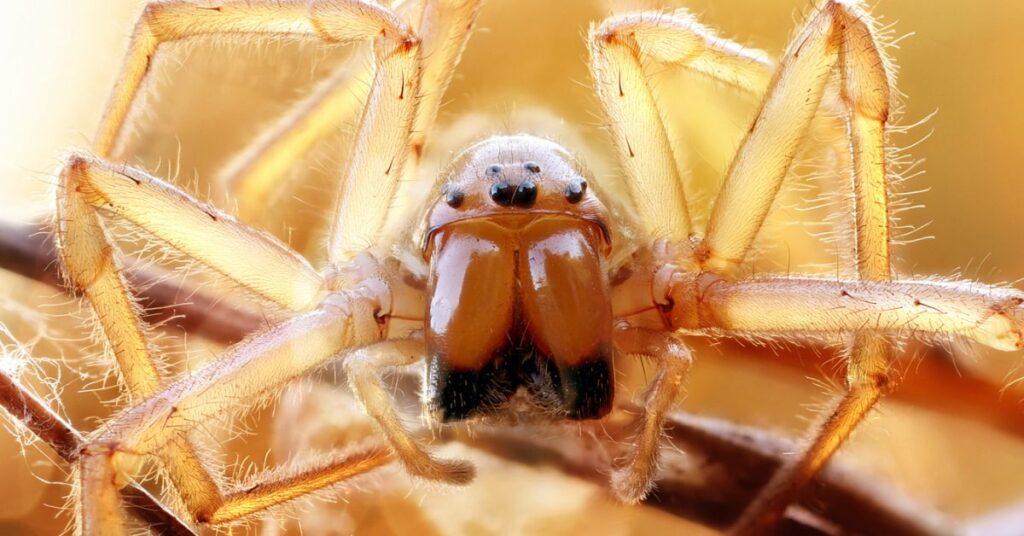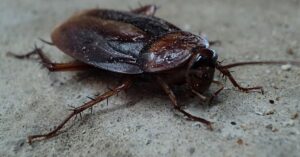
Can spiders smell? Do spiders have a sense of smell? Can they smell fear? It’s not immediately obvious, bearing in mind that they don’t possess a nose, but let’s break it down for you.
Who’d have thought it? That tiny little critter with no nose is able to smell! Just one of their spidey-senses, I guess. Let’s take a look in more detail at how that works.
HOW Do Spiders Smell?
Spiders have very fine hairs on their legs and therefore they need to physically touch the item where the smell emanates from.
Spiders don’t have particularly good eyesight, and have therefore evolved their other senses, such as their smell, in order to make up for this.
When you see a spider with his front legs touching everything in front of him, the spider is doing a simple smelling test.
What Smells do Spiders Like?
There are three main smells that spiders are attracted to:
Food

Human food (even the tiniest amount can attract them). Human food also attracts other insects which in turn attracts the spider.
Prey

The prey for spiders mostly consists of insects and other spiders, although a few large species also take birds and lizards.
It is estimated that the world’s 25 million tons of spiders kill 400–800 million tons of prey per year.
They use a wide range of strategies to capture prey: trapping it in sticky webs, lassoing it with sticky bolas, mimicking the prey to avoid detection, or running it down.
Spiders’ guts are too narrow to take solids, so they liquefy their food by flooding it with digestive enzymes.
They also grind food with the bases of their pedipalps, as arachnids do not have the mandibles that crustaceans and insects have.
Pheromones
Pheromones released in the silk produced by female spiders. Female spiders emit cuticular and/or silk-based sex pheromones, which can be airborne or received via contact with chemoreceptors on male pedipalps.
Airborne pheromones primarily attract males or elicit male searching behaviour. Contact pheromones stimulate male courtship behaviour and provide specific information about the emitter’s identity.
Male spiders are generally choosy and are often most attracted to adult virgin females and juvenile females prior to their final moult.
What Smells do Spiders Hate?
We have covered this in our article HERE but in general, spiders hate citrus smells, vinegar, and anything strong smelling (garlic, pepper etc.).
Can Spiders Smell Fear in Humans?
This is highly doubtful. When various animals are afraid, they may give off certain signals that can be detected by other organisms.
However, in the case of humans, the visual and aural signals we give off probably don’t get detected by spiders, as they have no particular benefit to gain from being able to detect something which is of such little use to them.
Can Spiders Smell Blood?

Despite a voracious taste for our blood, a species of jumping spider (Evarcha culicivora) is not equipped with the correct mouthparts to pierce through vertebrate skin to suck blood.
Instead, it preys on female mosquitoes that have recently taken blood from animals. The spider eats the blood-filled insects.
Robert Jackson of the University of Canterbury in Christchurch, New Zealand, was one of the scientists who discovered and named E. culicivora.
He noticed lots of these spiders living in and near houses in Kenya. To find out why, he launched a series of experiments.
First, Jackson and his co-workers presented the spiders with different types of prey.
The spiders were quick to attack mosquitoes. This showed that the eight-legged creatures found mosquitoes to be yummy.
After setting out four separate tunnels, experiments with 1,432 spiders showed that more than 80 percent of the spiders chose tunnels leading to mosquitoes that had eaten blood.
Finally, the scientists pumped the odours of various prey into the arms of a Y-shaped test chamber.
They found that spiders moved toward arms holding the scent of female blood-fed mosquitoes over other scents.
Even spiders that were raised in the lab and had never tasted blood were drawn to the sight and smell of blood-fed mosquitoes. This suggests that the taste for blood is something that this kind of jumping spider is born with.
We hope we have covered the basics and the above answers your question on can spiders smell. What do you think? Are you impressed with the way spiders can smell even though they have no nose? Remember to check out our article on what spiders hate here,and we look forward to bringing you more answers to your spider relation queries soon!
